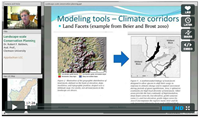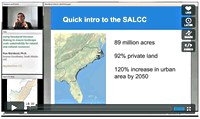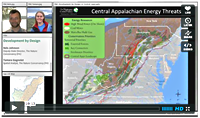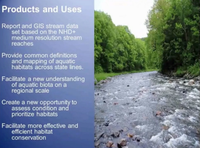Webinars
Research Presentations
A Stream Classification System for the Appalachians - View a video presentation by Mark Anderson and Arlene Olivero Sheldon of The Nature Conservancy, which provides an overview of The Stream Classification System research, design, and major deliverables.
Assessing Future Energy Development across the Appalachians - provides a detailed overview of the findings and major products from this research that used models to combine data on energy development trends and identifies where these may intersect with important natural resource and ecosystem services to give a more comprehensive picture of what potential energy development could look like in the Appalachians.
Classification and Mapping of Cave and Karst Resources - View a video presentation by Dr. David Culver of American University, which provides an overview of the unique cave and karst ecosystems of the Appalachians as well as the research and decision support tools created from this Appalachian LCC funded project.
Climate Change Vulnerability in the Appalachians - In these series of presentations, Dr. Lesley Sneddon of NatureServe gives an in-depth overview of the Climate Change Vulnerability in the Appalachians research. The bulk of the presentations provide viewers with step by step instructions on how to access, utilize, and interpret the many climate change vulnerability assessments for species and habitats - both previous assessments that were assembled by the research team and new assessments that were developed for this project.
Environmental Flows from Water Withdrawals in the Marcellus Shale Region - an overview on assessing availability of hydrologic and ecological flow model suitable for the region and the application of the model to anticipate how changes in stream flow will affect environmental conditions.
Riparian Restoration Decision Support Tool - a webinar explains how managers and researchers can tailor the decision support tool to their own specific needs and priority areas and resources.
Ecosystem Benefits and Risks Research - In this video presentation, Lars Pomara of the U.S. Forest Service details the work behind assessing and inventorying ecosystem benefits and environmental threats throughout the Appalachians. Lars describes how the first phase of this research provides conservation partners, resource managers, and the public with a synthesis of existing knowledge about ecosystem services and threats to their sustainability. Building upon this first phase, researchers will develop new assessments to better understand how Appalachian ecosystem services have changed - and are likely to change - as a result of urbanization, energy development, climate change, and other major drivers of rapid environmental change.
Appalachian LCC Update and Training on Tools/Resources:

Briefing to U.S. Fish and Wildlife Service Refuge Staff - This presentation focused on the research and deliverables from the Appalachian LCC Landscape Conservation Design project.
Briefing to the U.S. Fish and Wildlife Service Northeast Regional Office - The presentation covers the major threats to the Appalachians, the composition of the Cooperative, development of the Appalachian LCC Science Needs Portfolio, Work Plan, and Web Portal, and the Cooperative's funded projects to date.
Current Climate Science for Managers - what the science tells us about climate change, how managers can use this information, and how we communicate about this science
Data Sharing and the AppLCC Web Portal - presentation that describes the vision and functionality of the AppLCC web portal in regards to sharing and visualizing data.
Conservation Planning Area Overview - Dr. Paul Leonard provides a general overview of the GIS & Conservation Planning section within the Appalachian LCC Web Portal.
Landscape Conservation Cooperatives within the Regional Context:

The Conservation Resource Webinar - details LCCs Conservation Framework objectives
Conservation Adaptation Strategy - overview of LCCs in the southeast and steps taken to ensure emergence of National Network of LCCs
Landscape-scale Conservation Planning - principles, methods, and major goals of landscape conservation
Tools and Approaches - Neighboring LCCs

Conservation Planning Atlas - efforts and goals towards unifying various datasets under Conservation Planning Atlas resource
Habitat Assessment Models and Decision Support Tools for Aquatic Habitats - an update on the North Atlantic LCC funded project develop a decision support tool for an aquatic assessment of the Northeast
Representative Species and Conservation Design - presentation on the need for representative species to help develop maps, tools, and landscape designs
Planning and Foundational Tools for Aid in Landscape-scale Partner Products and Regional Initiatives

Assessing the Impact of Projected Housing Density on High Priority Forest Birds - modeling of bird abundance as a function of housing density, projects land cover change as a function of housing density, and estimates change in bird populations from 2000‐2030.
Development by Design - briefing related to planning, monitoring, and evaluating environmental impacts of Marcellus Shale drilling
Whole-System Landscape Vision - landscape conservation and the Central Appalachians Integrated Landscape Project
Webinar Series
U.S. FIsh and Wildlife Service Structured Decision Making - this series engages practitioners in the process of structured decision making using a variety of case studies
Safeguarding Wildlife from Climate Change - this series increases communication and transfer of technical information between conservation professionals regarding the increasing challenges from climate change



























